In explaining the relationship between their religious commitments and their actions to confront racist oppression, 19th century abolitionist Frederick Douglass and 20th century civil rights advocate Rabbi Abraham Joshua Heschel both described themselves as “praying with my feet.” The phrase still resonates in the 21st century. On the 3rd anniversary of the Unite the Right white supremacist attacks on Charlottesville, Virginia, a panel of religious racial justice activists reflect on what inspired them to counter-protest, and how theology and ethics motivate them to continue the work of racial justice.
(Above)
Local and national religious leaders and activists march together on August 12, 2017 in Charlottesville, Virginia, to counter-protest the Unite the Right rally. Photo © Jordy Yager
Speakers
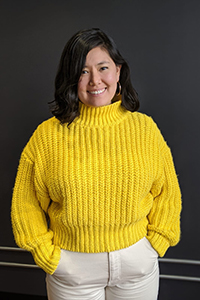
Grace Aheron
Grace Aheron (she/her) is an Asian American queer femme from Southwestern, Virginia. She graduated from the Religious Studies Department of the University of Virginia in 2013 with Highest Honors. Since her time at UVA, she has attended seminary and dropped out, started an intentional community in Charlottesville, and organized against white supremacy in its many forms. She is currently the Communications Director of Showing Up for Racial Justice, an international organization that organizes white communities for racial and economic justice. She lives in Charlottesville with her spouse.
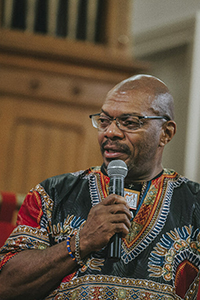
Photo: Ézé Amos
Deacon Don Gathers
Deacon Don Gathers is an organizer with the Charlottesville Public Housing Association of Residents and was a founding member of the Police Civilian Review Board which monitors local law enforcement. Gathers served as a co-chair of the 2016 Blue Ribbon Commission on Race, Memorials and Public Spaces which made recommendations to the Charlottesville City Council about the disposition of Confederate monuments. The following year, during the 2017 Summer of Hate, he co-founded the Charlottesville chapter of Black Lives Matter. Mr. Gathers is a deacon at Charlottesville’s First Baptist Church, a member of the Charlottesville Clergy Collective, a husband and father.
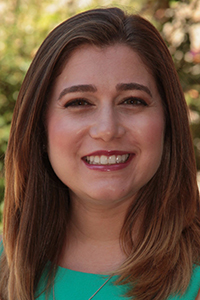
Rabbi Rachel Schmelkin
Rabbi Rachel Schmelkin served as associate rabbi for Charlottesville’s Congregation Beth Israel from 2016-2020. During her time in Charlottesville she was active in Charlottesville’s interfaith and social justice community. She was an involved member of the Charlottesville Clergy Collective, Congregate C’ville, The Women’s Clergy Circle, and the One America Movement. She received Truah’s “Action Under Fire Award,” for her work during the 2017 Summer of Hate. She received her bachelor of arts in psychology and Jewish studies from Indiana University at Bloomington with minors in Hebrew and history. She was ordained through Hebrew Union College-Jewish Institute of Religion, and was a recipient of the Tisch Rabbinical Fellowship. Rachel is married and has a son and dog.
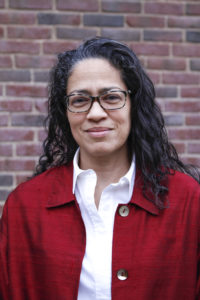
Photo: Jessica Gabbay
Jalane Schmidt
Jalane Schmidt is Associate Professor of Religious Studies at the University of Virginia, where she teaches courses on race, religion, and social change movements. A scholar-activist in Charlottesville, Virginia, she sits on the city’s Historic Resources Committee, the Jefferson School African American Heritage Center Advisory Committee, and plans and leads public history events which focus on local African American history. She and other racial justice activists organized to increase the #MoveTheStatue constituency turnout for Charlottesville’s 2016 Blue Ribbon Commission meetings on the disposition of Confederate monuments, and she cofounded the 2019-2020 Monumental Justice Virginia campaign which successfully overturned a century-old state law which had prohibited localities from removing Confederate statues. Schmidt cofounded the local chapter of Black Lives Matter during the 2017 Summer of Hate and continues community engagement for racial justice.
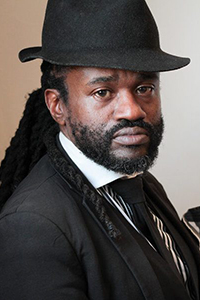
Photo: Heather Wilson
Rev. Osagyefo Uhuru Sekou
Rev. Osagyefo Uhuru Sekou is a community organizer, pastor, theologian, writer and musician. Under the auspices of Fellowship of Reconciliation, Rev. Sekou went to Ferguson, Missouri, during the 2014 Black Lives Matter protests of a white police officer’s killing of an unarmed Black teenager, Michael Brown. During the Ferguson Uprising, Rev. Sekou organized with local and national activists, and was arrested multiple times. He has trained thousands of activists and clergy in militant nonviolent direct action. During Charlottesville’s 2017 Summer of Hate, Rev. Sekou worked with Congregate Cville, a local faith-based “school for public witness” to prepare demonstrators for counter-protests.
Additional Resources:
Harold, Claudrena and Louis Nelson (eds). Charlottesville 2017 The Legacy of Race and Inequity. Charlottesville: University of Virginia Press, August 10, 2018.
Jenkins, Jack. “Meet the clergy who stared down white supremacists in Charlottesville.” ThinkProgress.org, August 16, 2017. https://archive.thinkprogress.org/clergy-in-charlottesville-e95752415c3e/
Kennel-Shenk, Celeste. “Faith leaders on the front lines in Charlottesville.” The Christian Century, August 18, 2017. https://www.christiancentury.org/article/faith-leaders-front-lines-charlottesville
O’Hare, Erin. “Telling the lion’s story: Charlottesville’s faith community employs activism to unite against supremacy.” C-Ville Weekly, August 8, 2018. https://www.c-ville.com/telling-lions-story-charlottesvilles-faith-community-employs-activism-unite-supremacy/
Schmidt, Jalane. “Excuse me, America, your house is on fire: Lessons from Charlottesvile on the KKK and “alt-right.” Medium.com, June 27, 2017. https://medium.com/resist-here/excuse-me-america-your-house-is-on-fire-lessons-from-charlottesville-on-the-kkk-and-alt-right-84aafddca685
Sacred & Profane, Season 2, Episode 11
American Idols
With our colleague Jalane Schmidt, we explore an often-overlooked aspect of Confederate monuments: religion.

